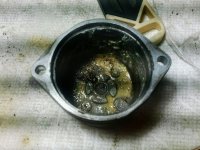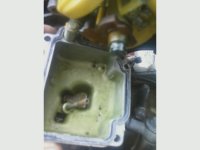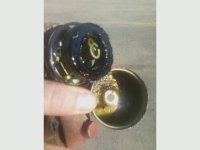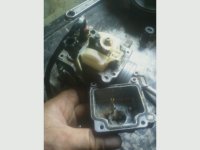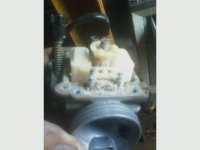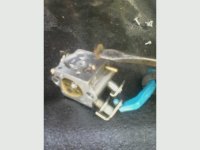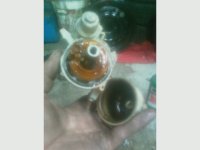Of course, there's no substitute for running 'em dry before you put 'em up for the season. But I have never been able to fathom a non-political reason to put corn likker in our gasoline. It takes a LOT more (mostly fossil-fueled) energy to make a gallon of the stuff than we can ever get out of it.
I don't actually recommend or believe in the running them dry theory.
I tell people all the time especially if they ask about it but that was an old school method that some people still swear by but yet I get a decent percentage of customers bringing me mowers that say they did that but....yet here they are with a mower that won't start and run.
The expression running them dry still doesn't get them completely dry.
It's better than doing nothing but you still have about half of the float bowl in a float bowl type system with fuel in there that is certainly going to evaporate and just a few days to a week or so.
It's what is Left behind after this evaporation that can still cause problems.
You just don't know how much white powdery crap, green crap, etc will be left coating the inside of the bowl and the carburetor and if when you pour fresh gas in it it will be enough to dissolve everything without a jet getting clogged up.
There is also the problem I have found that if someone runs the dry every season versus storing them wet with stabilized fuel and a full tank, they will end up with leaky fuel lines, and especially a needle and seat valve that does not seal off and the carb starts leaking several years earlier.
The best thing I have found is also not to bother with ethanol free fuel because if you simply use stabilizer (I exclusively use regular Sta-Bil and I use it at a ratio of 1 oz to every gallon)
You shouldn't have any noticeable problems..
I never do.
I have a 3 generators that I tried to start every year and the last time I tried them, one started on the second pull and one started on the 6th pull.
The other one is at a friend's place.
Storing them wet with fresh stabilized fuel and a full tank of gas will make the rubber and the needle and seat last longer.
Sure, ethanol-free fuel is better if you have easy access to it and it's not that much more expensive but I really don't find it necessary.
I just started two hedge trimmers 2 days ago that may have been used last year or it may have been 2 years..
Regardless, they were just sitting there on the garage floor in the corner with whatever gas that was in them when I got done using them last.
Luckily, none of the fuel lines were cracked and neither of the primer bulbs broke when I prime them and they both started right up after 8 or 10 pulls and I use them both and they ran well.
Of course I top them off with fresh stabilized fuel first.
One big problem is people don't realize it has to be fresh stabilized fuel.
DO NOT just grab your gas can and pour some stabilizer in it or cheat and pour some stabilizer into the gas tank on your machine and think that's the same as going to the station and adding your stabilizer to an empty gas can and then getting fresh fuel. It is not the same.

